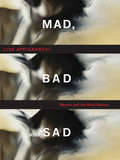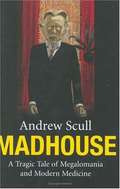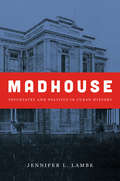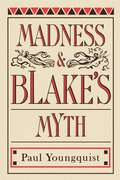- Table View
- List View
Mad or Bad?: A Critical Approach to Counselling and Forensic Psychology
by Andreas Vossler Dr Bianca Raabe Dr Catriona Havard Professor Graham Pike Meg-John BarkerA cutting-edge text that provides a comprehensive introduction to mental health problems and criminal behaviour, this book explores the link between mental health and criminality and considers the most common and effective therapeutic approaches for working with offenders and victims of crime. · Part 1 explores the predominant tensions between forensic and therapeutic agendas; · Part 2 considers how criminal and ‘insane’ identities and careers may be considered gendered, classed, culturally and age-dependent experiences, and be related to power and oppression; · Part 3 examines issues around sex and sexuality in forensic and therapeutic settings; · Part 4 introduces a range of therapeutic approaches for working with offenders and victims of crime; · Part 5 covers forensic and therapeutic practices, including programmes for the prevention of both mental health issues and offending. Edited by an expert team from the Open University and written by a broad range of contributors, this book draws on a wealth of experience in this popular subject area. It will be a key text for students of forensic psychology, counselling and psychotherapy, and for health and social care professionals working in therapeutic and forensic settings.
Mad with Freedom: The Political Economy of Blackness, Insanity, and Civil Rights in the U.S. South, 1840–1940
by Élodie Edwards-GrossiThe use of race in studies of insanity in the 1840s and 1850s gave rise to politically charged theories on the differential biology and pathologies of brains in whites and Blacks. In Mad with Freedom, Élodie Edwards-Grossi explores the largely unknown social history of these racialized theories on insanity in the segregated South. She unites an institutional history of psychiatric spaces in the South that housed Black patients with an intellectual history of early psychiatric theories that defined the Black body as a locus for specific pathologies. Edwards-Grossi also reveals the subtle, localized techniques of resistance later employed by Black patients to confront medical power. Her work shows the continuous politicization of science and theories on insanity in the context of Reconstruction and the Jim Crow South.
Mad, Bad And Sad: A History of Women and the Mind Doctors from 1800 to the Present
by Lisa AppignanesiMad, bad and sad. From the depression suffered by Virginia Woolf and Sylvia Plath to the mental anguish and addictions of iconic beauties Zelda Fitzgerald and Marilyn Monroe. From Freud and Jung and the radical breakthroughs of psychoanalysis to Lacan's construction of a modern movement and the new women-centred therapies. This is the story of how we have understood mental disorders and extreme states of mind in women over the last two hundred years and how we conceive of them today, when more and more of our inner life and emotions have become a matter for medics and therapists.
Mad, Bad And Sad: A History of Women and the Mind Doctors from 1800 to the Present
by Lisa AppignanesiMad, bad and sad. From the depression suffered by Virginia Woolf and Sylvia Plath to the mental anguish and addictions of iconic beauties Zelda Fitzgerald and Marilyn Monroe. From Freud and Jung and the radical breakthroughs of psychoanalysis to Lacan's construction of a modern movement and the new women-centred therapies. This is the story of how we have understood mental disorders and extreme states of mind in women over the last two hundred years and how we conceive of them today, when more and more of our inner life and emotions have become a matter for medics and therapists.
Mad, Bad and Sad: A History of Women and the Mind Doctors
by Lisa AppignanesiThis fascinating history of mind doctors and their patients probes the ways in which madness, badness, and sadness have been understood over the last two centuries. Lisa Appignanesi charts a story from the days when the mad were considered possessed to our own century when the official psychiatric manual lists some 350 mental disorders. Women play a key role here, both as patients "among them Virginia Woolf, Sylvia Plath, and Marilyn Monroe" and as therapists. Controversially, Appignanesi argues that women have significantly changed the nature of mind-doctoring, but in the process they have also inadvertently highlighted new patterns of illness.
Mad, Bad, and Sad: A History of Women and the Mind Doctors
by Lisa Appignanesi"[A work of] wit, wisdom and richness. . . . A grand tour of derangement, from matricide to anorexia." --John Leonard, Harper's This fascinating history of mind doctors and their patients probes the ways in which madness, badness, and sadness have been understood over the last two centuries. Lisa Appignanesi charts a story from the days when the mad were considered possessed to our own century when the official psychiatric manual lists some 350 mental disorders. Women play a key role here, both as patients--among them Virginia Woolf, Sylvia Plath, and Marilyn Monroe--and as therapists. Controversially, Appignanesi argues that women have significantly changed the nature of mind-doctoring, but in the process they have also inadvertently highlighted new patterns of illness.
Mad-Doctors in the Dock: Defending the Diagnosis 1760–1913
by Joel Peter Eigen“Detailed courtroom narratives . . . give us a colorful and gripping sense of the life-and-death maneuvers involved in mounting an insanity defense.” —Andrew Scull, author of Madness in CivilizationShortly before she pushed her infant daughter headfirst into a bucket of water and fastened the lid, Annie Cherry warmed the pail because, as she later explained to a police officer, “It would have been cruel to put her in cold water.” Afterwards, this mother sat down and poured herself a cup of tea. At Cherry’s trial at the Old Bailey in 1877, Henry Charlton Bastian, physician to the National Hospital for the Paralyzed and Epileptic, focused his testimony on her preternatural calm following the drowning. Like many other late Victorian medical men, Bastian believed that the mother’s act and her subsequent behavior indicated homicidal mania, a novel species of madness that challenged the law’s criterion for assigning criminal culpability.How did Dr. Bastian and his cohort of London’s physicians, surgeons, and apothecaries—originally known as “mad-doctors”—arrive at such an innovative diagnosis, and how did they defend it in court? Mad-Doctors in the Dock is a sophisticated exploration of the history of the insanity defense in the English courtroom from the middle of the eighteenth century to the early twentieth century. Joel Peter Eigen examines courtroom testimony offered in nearly 1,000insanity trials, transporting us into the world of psychiatric diagnosis and criminal justice. The first comprehensive account of how medical insight and folk psychology met in the courtroom, this book makes clear the tragedy of the crimes, the spectacle of the trials, and the consequences of the diagnosis for the emerging field of forensic psychiatry.
Made To Stick: Why Some Ideas Take Hold and Others Come Unstuck
by Chip Heath Dan HeathWhat is that makes urban myths so persistent but many everyday truths so eminently forgettable? How do newspapers set about ensuring that their headlines make you want to read on? And why do we remember complicated stories but not complicated facts? In the course of over ten years of study, Chip and Dan Heath have established what it is that determines whether particular ideas or stories stick in our minds or not, and Made to Stick is the fascinating outcome of their painstaking research. Packed full of case histories and thought-provoking anecdotes, it shows, among other things, how one Australian scientist convinced the world he'd discovered the cause of stomach ulcers by drinking a glass filled with bacteria, how a gifted sports reporter got people to watch a football match by showing them the outside of the stadium, and how high-concept pitches such as 'Jaws on a spaceship' (Alien) and 'Die Hard on a bus' (Speed) convince movie executives to invest vast sums of money in a project on the basis of almost no information. Entertaining and informative by turns, this is a fascinating and multi-faceted account of a key area of human behavior. At the same time, by showing how we can all use such cleverly devised strategies as the 'Velcro Theory of Memory' and 'curiosity gaps', it offers superbly practical insights, setting out principles we all can adopt to make sure that we get our ideas across effectively.
Made You Up
by Francesca Zappia<P>This thought-provoking debut tells the story of Alex, a high school senior—and the ultimate unreliable narrator—unable to tell the difference between real life and delusion. <P>Alex fights a daily battle to figure out what is real and what is not. Armed with a take-no-prisoners attitude, her camera, a Magic 8 Ball, and her only ally (her little sister), Alex wages a war against her schizophrenia, determined to stay sane long enough to get into college. <P>She's pretty optimistic about her chances until she runs into Miles. Didn't she imagine him? Before she knows it, Alex is making friends, going to parties, falling in love, and experiencing all the usual rites of passage for teenagers. But Alex is used to being crazy. She's not prepared for normal. Can she trust herself? Can we trust her?
Made for Each Other: The Biology of the Human-animal Bond
by Meg Daley OlmertOxytocin is a hormone that has been implicated in romantic and maternal love. As a producer of nature documentaries for television who participated in research on the neurobiology of social bonding, Olmert examines the evidence for oxytocin as also being the basis for the evolution of the human-animal bond. Her interesting, general audience treatment concludes by noting the facilitators and barriers modern society poses for this relationship. Annotation ©2009 Book News, Inc. , Portland, OR (booknews. com)
Made for Good Purpose: What Every Parent Needs to Know to Help Their Adolescent with Asperger's, High Functioning Autism or a Learning Difference Become an Independent Adult
by Stephen Shore Michael P. McmanmonMany teenagers with Asperger's Syndrome leave school feeling unsure of how to take the next steps in their lives. Leaving the comforts of home and facing the unknown can be daunting, but with the right support and advice these young adults can adapt and enjoy their newly-acquired independence. Filled with useful advice, easy-to-apply techniques, and insights from both the author's own experiences of Asperger's Syndrome and those of his students, this book is a practical guide for helping young adults on the spectrum achieve independence and learn life-long skills of self-knowledge, self-sufficiency, and self-advocacy. With chapters on social skills, handling finances, keeping healthy, and succeeding in higher education or first employment, Dr. McManmon provides the encouragement that any young Aspie needs to make the transition from an adolescent into a happy, confident and engaged adult. This book will be essential reading for parents, young adults with Asperger's Syndrome, high-functioning autism or learning differences, and any professionals who work with them.
Made for Life: Coping, Competence and Cognition (Psychology Library Editions: Emotion)
by Johanna TurnerOriginally published in 1980, this title considers the relationship between feeling able to cope and being able to learn – that is, the interdependence of affect and cognition in children under five. It argues that in order to make full use of his cognitive capacities the child must first develop the belief that he is able to cope and be effective. When the child enters school at the age of five his behaviour will reflect the influence of various important developmental factors. It is only by understanding the nature of the interactions of these influences that one can sympathetically appreciate and, if necessary, modify the child’s perception of the situation with which he is faced. The argument presented follows the discrete strands of development which form the plait of individual differential perception and draws upon the case of work of clinicians using psychoanalytic concepts, experimental investigations of infants and children, naturalistic observations and longitudinal studies, since it is believed that these contemporary, yet distinct, approaches draw attention to different aspects of the multifaceted human child. As such the book was both a useful survey of this important complex field of study at the time and is still a stimulating contribution to the debate.
Made to Flourish: Beyond Quick Fixes to a Thriving Organization
by Shelley G. TrebeschEvery organization is made to flourish. But when problems arise, quick fixes and poor leadership training can drag it down. The key to a thriving team is to look below the surface at the hidden dynamics that can cause it to lose focus, turn inward or even cease to exist. Budget problems, personality conflicts, mission drift, government regulations—all these and more can tempt us to respond rapidly and superficially. Shelley Trebesch offers leaders the tools needed to develop practical solutions that actually work. She provides a model for getting a firm hold on the complexities inherent in any team. Diagrams help readers visualize key dynamics while vivid case studies illustrate how to put the book into practice. Here is the book that gives churches, NGOs, mission agencies, parachurch groups, other nonprofits, businesses and teams within these groups what they need. Trebesch charts the path to the life-giving, holistic, fruitful abundance that God intended for organizations and everyone in them.
Made to Stick: Why Some Ideas Survive and Others Die
by Chip Heath Dan HeathWhat is that makes urban myths so persistent but many everyday truths so eminently forgettable? How do newspapers set about ensuring that their headlines make you want to read on? And why do we remember complicated stories but not complicated facts? In the course of over ten years of study, Chip and Dan Heath have established what it is that determines whether particular ideas or stories stick in our minds or not, and Made to Stick is the fascinating outcome of their painstaking research. Packed full of case histories and thought-provoking anecdotes, it shows, among other things, how one Australian scientist convinced the world he'd discovered the cause of stomach ulcers by drinking a glass filled with bacteria, and how a gifted sports reporter got people to watch a football match by showing them the outside of the stadium.
Madeleine: Our daughter's disappearance and the continuing search for her
by Kate McCannKate McCann's personal account of the disappearance and continuing search for her daughter, revised and updated.'The decision to publish this book has been very difficult, and taken with heavy hearts ... My reason for writing it is simple: to give an account of the truth ... Writing this memoir has entailed recording some very personal, intimate and emotional aspects of our lives. Sharing these with strangers does not come easily to me, but if I hadn't done so I would not have felt the book gave as full a picture as it is possible for me to give. As with every action we have taken over the last five years, it ultimately boils down to whether what we are doing could help us to find Madeleine. When the answer to that question is yes, or even possibly, our family can cope with anything ... Nothing is more important to us than finding our little girl.' -- Kate McCann'A must-read' Sunday Express'Kate's book blazes with the sheer visceral force of her love for her daughter' Daily Mail'Deeply moving' Guardian
Madhouse: A Tragic Tale of Megalomania and Modern Medicine
by Andrew ScullMadhouse reveals a long-suppressed medical scandal, shocking in its brutality and sobering in its implications. It shows how a leading American psychiatrist of the early twentieth century came to believe that mental illnesses were the product of chronic infections that poisoned the brain. Convinced that he had uncovered the single source of psychosis, Henry Cotton, superintendent of the Trenton State Hospital, New Jersey, launched a ruthless campaign to "eliminate the perils of pus infection." Teeth were pulled, tonsils excised, and stomachs, spleens, colons, and uteruses were all sacrificed in the assault on "focal sepsis." Many patients did not survive Cotton's surgeries; thousands more were left mangled and maimed. Cotton's work was controversial, yet none of his colleagues questioned his experimental practices. Subsequent historians and psychiatrists too have ignored the events that cast doubt on their favorite narratives of scientific and humanitarian progress. In a remarkable feat of historical detective work, Andrew Scull exposes the full, frightening story of madness among the mad-doctors. Drawing on a wealth of documents and interviews, he reconstructs in vivid detail a nightmarish, cautionary chapter in modern psychiatry when professionals failed to police themselves.
Madhouse: Psychiatry and Politics in Cuban History (Envisioning Cuba)
by Jennifer L. LambeOn the outskirts of Havana lies Mazorra, an asylum known to--and at times feared by--ordinary Cubans for over a century. Since its founding in 1857, the island's first psychiatric hospital has been an object of persistent political attention. Drawing on hospital documents and government records, as well as the popular press, photographs, and oral histories, Jennifer L. Lambe charts the connections between the inner workings of this notorious institution and the highest echelons of Cuban politics. Across the sweep of modern Cuban history, she finds, Mazorra has served as both laboratory and microcosm of the Cuban state: the asylum is an icon of its ignominious colonial and neocolonial past and a crucible of its republican and revolutionary futures.From its birth, Cuban psychiatry was politically inflected, drawing partisan contention while sparking debates over race, religion, gender, and sexuality. Psychiatric notions were even invested with revolutionary significance after 1959, as the new government undertook ambitious schemes for social reeducation. But Mazorra was not the exclusive province of government officials and professionalizing psychiatrists. U.S. occupiers, Soviet visitors, and, above all, ordinary Cubans infused the institution, both literal and metaphorical, with their own fears, dreams, and alternative meanings. Together, their voices comprise the madhouse that, as Lambe argues, haunts the revolutionary trajectory of Cuban history.
Madkind: The Origin and Development of the Mind (Collected Works of Charles Berg)
by Charles BergFirst published in 1962, the original blurb reads: ‘This provocative book explores the whole range of human thought conduct and beliefs. Commencing with primitive man and his superstitions it goes on to study our present-day cultural institutions, customs, ritual and other behaviour upon which we pride ourselves. All of these are shown to have identical primitive mechanisms and to be subjectively determined without reference to scientific knowledge. These delusions are shown to be mostly undesirable and harmful and the author goes on to state that only objective thinking, scientifically based, can lead to any ultimate good. The later chapters contain an aetiological study of the mind. The author states "If we can consider the human mind in the light of its origin and development we may better appreciate its basic nature and its inevitable limitations". The subject matter is amply illustrated with clinical examples in Dr Berg’s usual lively style. This book is one which will affect all readers. None of us is immune from delusions, however much we may delude ourselves to the contrary, and the presentation of these truths will to some of us seem shocking in the extreme.’ Today it can be read and enjoyed in its historical context.
Madman: Strange Adventures Of A Psychology Intern
by John R. SulerInternship. Doesn't "intern" mean "to imprison?" We're expected to work our butts off, all in the name of Training. It seemed more like a grueling rite of passage than anything else-- the establishment's last chance to test the limits of the student's psyche before welcoming him to the club.
Madness Explained: Psychosis and Human Nature
by Richard P BentallA revised edition of Madness Explained, Richard Bentall's groundbreaking classic on mental illness In Madness Explained, leading clinical psychologist Richard Bentall shatters the modern myths that surround psychosis. Is madness purely a medical condition that can be treated with drugs? Is there a clear dividing line between who is sane and who is insane? For this revised edition, he adds new material drawing on the recent advances in molecular genetics, new studies of the role of environment in psychosis, and important discoveries on early symptoms preceding illness, among other important developments in our understanding.'Madness Explained is a substantial, yet highly accessible work. Full of insight and humanity, it deserves a wide readership.' Sunday Times 'Will give readers a glimpse both of answers to their own problems, and to questions about how the mind works' Independent Magazine Richard P. Bentall holds a Chair in Experimental Clinical Psychology at the University of Manchester. In 1989 he received the British Psychological Society's May Davidson Award for his contribution to the field of Clinical Psychology.
Madness In The Streets: How Psychiatry And The Law Abandoned The Mentally Ill
by Rael J. Isaac Virginia C. ArmatExamines the cultural and political issues surrounding the problem of America's homeless mentally ill
Madness Is Civilization
by Michael E. StaubIn the 1960s and 1970s, a popular diagnosis for America’s problems was that society was becoming a madhouse. In this intellectual and cultural history, Michael E. Staub examines a time when many believed insanity was a sane reaction to obscene social conditions, psychiatrists were agents of repression, asylums were gulags for society’s undesirables, and mental illness was a concept with no medical basis. Madness Is Civilization explores the general consensus that societal ills--from dysfunctional marriage and family dynamics to the Vietnam War, racism, and sexism--were at the root of mental illness. Staub chronicles the surge in influence of socially attuned psychodynamic theories along with the rise of radical therapy and psychiatric survivors' movements. He shows how the theories of antipsychiatry held unprecedented sway over an enormous range of medical, social, and political debates until a bruising backlash against these theories--part of the reaction to the perceived excesses and self-absorptions of the 1960s--effectively distorted them into caricatures. Throughout, Staub reveals that at stake in these debates of psychiatry and politics was nothing less than how to think about the institution of the family, the nature of the self, and the prospects for, and limits of, social change. The first study to describe how social diagnostic thinking emerged, Madness Is Civilization casts new light on the politics of the postwar era.
Madness and Blake's Myth (G - Reference, Information and Interdisciplinary Subjects)
by Paul YoungquistThis book offers the first systematic study of madness and its significance for the poetry of William Blake. Blake's reputation as an artist was long clouded by suspicions of madness. Although the great victory of his modern critics has been to see his work clearly, unobstructed by this prejudice, criticism now runs the risk of vindicating Blake the poet at the expense of understanding certain elements of his poetry. In Madness and Blake's Myth, Paul Youngquist argues that, in its thematic content and dramatic method, Blake's myth is about madness. From the early lyrics to the late epic-prophecies, Blake repeatedly dramatizes the dissociation of a unified mind in a manner that comes increasingly to resemble the major symptoms of mental illness. Drawing upon recent clinical and philosophical inquiries, Youngquist shows how Blake makes poetry out of mental suffering; madness comes to operate in his myth as a metaphor for the Fall. For all its literary sophistication, however, Blake's mythology serves specific psychological needs, acquiring a therapeutic function for Blake personally as a defense against the madness it dramatizes. Madness and Blake's Myth is a challenging reexamination of both a sophisticated literary achievement and the mind that conceived it.
Madness and Civilization: A History of Insanity in the Age of Reason (Routledge Classics)
by Michel FoucaultPerhaps the French philosopher's masterpiece, which is concerned with an extraordinary question: What does it mean to be mad?
Madness and Distress in Music Education: Toward a Mad-Affirming Approach
by Juliet HessMadness and Distress in Music Education offers an in-depth exploration of mental health and emotional distress in the context of music education, offering new ways of thinking about these experiences and constructing ways to support distress through affirming pedagogy, practices, and policies in music education. Centering the lived experiences of 15 people in a range of roles across music education who self-identify an issue with their mental health, the volume addresses impacts on both students and educators. The author draws on Mad Studies and disability studies to present new paradigms for thinking about Madness and distress in the music context. An essential resource for music educators, music education researchers, and preservice students seeking to understand the complexities of mental health in the music classroom, this book considers how people conceptualize their mental health, how distress impacts participation in music education, how music education may support or exacerbate distress, and what supports for distress can be implemented in music education.























